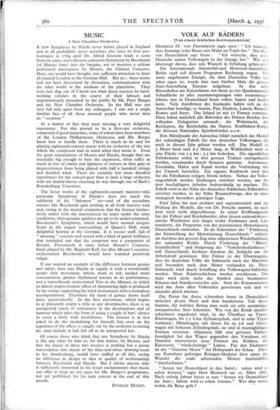MUSIC
A New Chamber Orchestra A NEW Symphony by Haydn never before played in England and in all probability never anywhere else since its first per- formance in 1784 until Dr. Alfred Einstein made a score from the parts, and a likewise unknown Symphony by Boccherini (of Minuet fame) into the bargain, not to mention a seldom performed masterpiece by Mozart, the Clarinet Concerto. Here, one would have thought, was sufficient attraction to draw all musical London to the Grotrian Hall. But no ; these works had not been discovered by divination, communication with the other world or the medium of the planchette. They were just dug out of I know not what dusty recesses by hard- working scholars in the course of their labours and unpretentiously presented to the public by Mr. Peter Burges and his New Chamber Orchestra. So the Hall was not very full and, apart from my colleagues, I saw not a single familiar face of all those musical people who never miss an " occasion."
As a matter of fact they were missing a very delightful experience. For this proved to be a first-rate orchestra, composed of good musicians, some of whom have been members of the London Philharmonic Orchestra, and Mr. Burges knew how to handle them. There is much to be said for playing eighteenth-century music with an orchestra of the size which the composers had in mind when they wrote it. Even the great masterpieces of Mozart and Haydn, though they are musically big enough to bear the expansion, often suffer as much in loss of clarity and lightness of texture as they gain in impressiveness from being played with half a hundred strings and doubled wind. There are certainly few more dreadful experiences for the concert-goer than to hear a large orchestra with ten double-basses churning its way through one of Bach's Brandenburg Concertos.
The lesser works of the eighteenth-century masters—this particular Symphony of Haydn's does not reach the sublimity of his " Salomon " set—and of the secondary masters like Boccherini gain nothing at all from massive tone and, owing to the mental comparison that the listener instinc- tively makes with the masterpieces he hears under the same conditions, their genuine qualities are apt to be under-estimated. Boccherini's Symphony, which would have seemed insigni- ficant in the august surroundings of Queen's Hall, made delightful hearing at the Grotrian. It is rococo stuff, full of " amusing " conceits and scored with a kind of garish brilliance that reminded one that the composer was a compatriot of Rossini. Fortunately it came before Mozart's Concerto, finely played by Mr. Reginald Kell, for after Mozart's sensitive orchestration Boccherini's would have sounded positively vulgar.
If one wanted an example of the difference between genius and talent, here was Haydn to supply it with a wonderfully tender slow movement, which, truth to tell, needed more concentration, greater rhythmical tension in its performance, and a marvellously orchestrated Trio to the Minuet, in which an almost impressionistic effect of shimmering light is produced by the strings supporting the wind-instruments with a tremulous accompaniment. Elsewhere the hand of genius shows itself more spasmodically. In the first movement, which begins in as pleasantly empty a style as any divertimento, there is an unexpected touch of seriousness in the development and of humour which takes the form of using a couple of bars' silence to cover a fairly wide modulation. The listener is in fact asked to do the modulating for himself, but, even on the repetition of the effect, is caught out by the orchestra restarting the same melody it had left off in an unexpected key.
Of course those who think that any Symphony by Haydn is like any other by him or, for that matter, by Mozart, and that the music of these two masters is nothing but a pretty transcription into music of the blue-and-silver drawing-room in the Amalienburg, would have sniffed at all this, seeing no difference in design or idea or quality of workmanship between Boccherini and Haydn. But I advise anyone who is sufficiently interested in the lesser enchantments that music can offer to keep an eye open for Mr. Burges's programme, not yet published, for his next concert at the end of this month.
DYNELEY HUSSEY.






































































 Previous page
Previous page